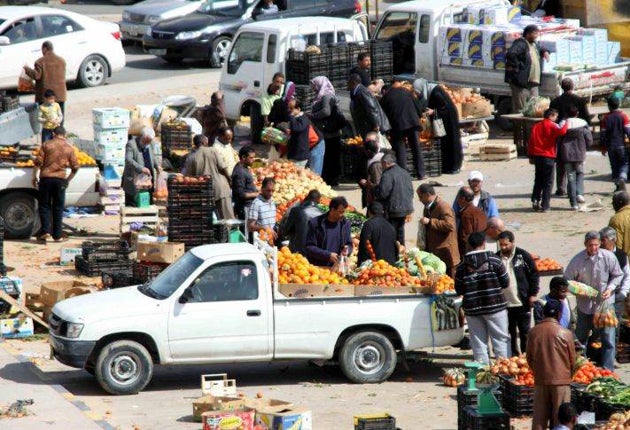Donald Macintyre: Between sanctions and propaganda lies a reality of shortages and ballooning prices

Your support helps us to tell the story
From reproductive rights to climate change to Big Tech, The Independent is on the ground when the story is developing. Whether it's investigating the financials of Elon Musk's pro-Trump PAC or producing our latest documentary, 'The A Word', which shines a light on the American women fighting for reproductive rights, we know how important it is to parse out the facts from the messaging.
At such a critical moment in US history, we need reporters on the ground. Your donation allows us to keep sending journalists to speak to both sides of the story.
The Independent is trusted by Americans across the entire political spectrum. And unlike many other quality news outlets, we choose not to lock Americans out of our reporting and analysis with paywalls. We believe quality journalism should be available to everyone, paid for by those who can afford it.
Your support makes all the difference.In the covered fish market inside the old souk in central Tripoli yesterday, Osama Ahmed Omar, a fishmonger as well as a fisherman, brandished a giant prawn. "You see there is not problem," he said proudly. "Before, these used to be 15 dinars a kilo, now they are 10."
But how, with all the talk of shortages and rising prices?
"We are working harder. We used to fish for six hours a day now we are doing it for 10. We are sending a message to the world that everything is OK and to make our people happy because the fish is no more expensive."
But isn't diesel for the fishing boats a problem, given the long queues of cars seen outside petrol stations and complaints that some fuel had septupled in price at one point? No, explained Mr Omar, 38. Since 18 February, the government had subsidised fuel prices for fishermen – so that diesel for their boats that 12 dinars a tank was now only five.
Perhaps. But establishing facts in western Libya these days is about as easy as picking up mercury with a fork. And none more so than the impact of both the current crisis and international sanctions on Libya's domestic economy. Partly this is because of the dizzying speed with which Libya's propaganda alternates between warnings of the suffering threatened by international sanctions, and portrayal of ordinary life in the country as unaffected by the crisis, despite the obvious adverse impact on, say, the banking system.
Partly because of the habit in normal times, of paying out of its oil revenues massive subsidies – at a rate of around $600m a year – on basic foods and petrol, the Libyan regime can claim that life is carrying on as normal.
As Libyan oil exports start to dry up as a result of sanctions, the source of the subsidies certainly will too. But for now Col Gaddafi may still be using his reportedly vast, if depleting, multi-billion dollar cash assets to keep at least some of them going, as well as to pay and arm his "volunteer" militias. Nevertheless here are few random facts gleaned in the city.
Though the official exchange rate of 1.2 dinars to the dollar is pegged, the soaring retail black market offered by the young men who lounge on street corners flicking through their wads of banknotes in the old city, tell a more truthful story of growing economic anxiety. Typically, they buy your dollars at a rate of 1.9, and sell at 2.1.
"Things are bad," said one of their friends. "There is no work". Why? "I may know but I'm sorry, I can't say."
The regime shelled out a one-off 500 dinar payment to families at the beginning of the crisis, whether to cushion them against a reported drying up of salaries as the sanctions bite, to buy loyalty, or both. And a half-kilo of salty olives bought yesterday cost two dinars, the same, the vendor said, as before the uprising.
But there may be other reasons why Mr Omar may be working harder. In Sirte last week the fishing boats were all laid up because the Egyptians who man them had fled. Indeed the flight of foreigners in an economy in which there is normally both 30 per cent unemployment and 2 million workers from abroad has been catastrophic. This had led to long queues outside the Egyptian-manned bakeries.
The effect, according to one shopkeeper, has also been a doubling in the price of some vegetables grown at foreign-manned farms. And this makes it all the more confusing when Khirir Zaid, 42, a Gaddafi loyalist who receives 500 dinars a month in benefits as a divorcée, claimed in the souk yesterday that the only price rise she had noticed was a half-dinar per kilo increase in the price of meat.
Yet the poverty of hard official information is underlined by the issue of imports. Khaled Kaim, Libya's Foreign Minister, said on Wednesday that there were no longer queues at petrol stations in Tripoli because people had stopped panic buying. Yesterday, however, there were still queues.
Two weeks ago, the chairman of the ports authority said that the four to seven ships a week, which could normally by relied on to bring in food, fuel and medicine, had fallen to zero because of the sanctions. Were fuel ships – needed because of damage to the refineries – now arriving? The olive seller had heard so. But Mr Kaim was not saying.
Join our commenting forum
Join thought-provoking conversations, follow other Independent readers and see their replies
Comments